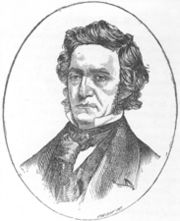Difference between revisions of "Jackson Morton"
(New page: {{Infobox Politician | subject_name =Jackson Morton | image_name =JacksonMorton.jpg | image_size =180px | image_caption = | office =[[United States Senate|United States ...) |
m |
||
| Line 1: | Line 1: | ||
| + | {{wikipedia}} | ||
{{Infobox Politician | {{Infobox Politician | ||
| subject_name =Jackson Morton | | subject_name =Jackson Morton | ||
| Line 22: | Line 23: | ||
| signaturesize = | | signaturesize = | ||
}} | }} | ||
| − | |||
'''Jackson Morton''' ([[1794]]-[[1874]]) was an [[Antebellum period|antebellum]] [[United States Senate|United States Senator]] from Florida and then a member of the Congress of the [[Confederate States]] during the [[Civil War]]. | '''Jackson Morton''' ([[1794]]-[[1874]]) was an [[Antebellum period|antebellum]] [[United States Senate|United States Senator]] from Florida and then a member of the Congress of the [[Confederate States]] during the [[Civil War]]. | ||
Revision as of 16:04, 4 March 2009
| Jackson Morton | |
|---|---|
|
| |
| United States Senator Florida Class 3 | |
| In office 1849-1855 | |
| Representative to the Provisional Confederate Congress Florida | |
| In office 1861 | |
|
| |
| Born | August 10, 1794 Fredericksburg, Virginia |
| Died | November 20, 1874 |
Jackson Morton (1794-1874) was an antebellum United States Senator from Florida and then a member of the Congress of the Confederate States during the Civil War.
Early life
Morton was born in Fredericksburg, Virginia. He was the brother of Jeremiah Morton, a U.S. Representative from Virginia. Jackson Morton graduated from Washington College (now Washington and Lee University) of Lexington, Virginia, in 1814 and from the College of William and Mary in Williamsburg, Virginia, in 1815. Morton moved to Pensacola, in 1820 and engaged in the lumber business.
U.S. government
In 1836, Morton became a member of the Florida Territorial Legislative Council and served as its president in 1837. In 1838, he was a delegate to the state constitutional convention for the first Florida Constitution. Morton was a Navy agent in Pensacola from 1841 to 1845. In 1848, he was a presidential elector on the Whig Party ticket.
Morton was elected to the U.S. Senate in 1848. He took office on March 4, 1849 and served until March 3, 1855, not having been a candidate for reelection. Morton resumed activity in the lumber business after his senate service.
Confederate government
As the slavery division grew between northern and southern United States, Morton became active in the development of the Confederacy. On November 30, 1860, he was chosen to represent Santa Rosa County as a delegate of the Florida Secession Convention in Tallahassee. On January 7, 1861, Morton was appointed to be part of a twelve-person committee to prepare an Ordinance of Secession for Florida[1]. Morton and George Taliaferro Ward attempted to have the ordinance amended so that Florida would not secede until Georgia and Alabama seceded and so that popular ratification would be required. They were overruled on January 8, 1861, and the ordinance went to a vote as planned[2]. Morton voted in favor of secession and, on January 10, 1861, by a vote of 62-7, Florida became the third state to leave the United States.
On January 17, 1861, Morton was appointed to be a delegate to the Montgomery, Alabama, convention for constructing a provisional Confederate government. On February 4, 1861, the delegates met and drafted the Provisional Confederate States Constitution which was signed by Morton and the rest of the delegates four days later. The delegates at this convention became the Provisional Confederate Congress. Morton served for the duration of the provisional congress and, in the month following the provisional constitution, he also signed its successor, the Confederate States Constitution[1]. Morton and Augustus Maxwell were the only people to represent Florida in both the United States Congress and the Confederate Congress.
Jackson Morton returned to Santa Rosa County and died at his home, "Mortonia," near Milton, on November 22, 1874. Morton was interred there in a private cemetery.
References
- Brian R. Rucker. Jackson Morton: West Florida's Soldier, Senator, and Secessionist. Patagonia Pr, 1990.
- Jackson Morton Congressional biography
- PoliticalGraveyard.com
- CivilWarHome.com
{[refend}}

